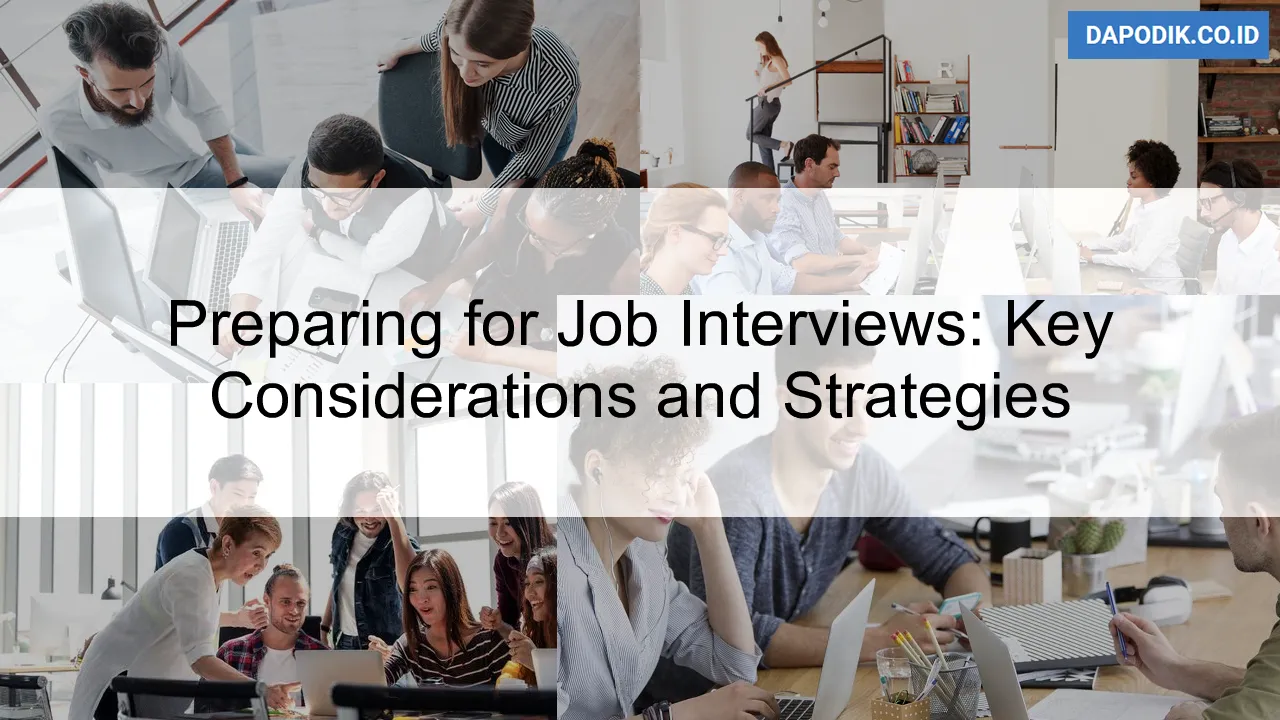Preparing for job interviews can be a daunting task. This article explores key considerations and strategies to help you ace your next interview and stand out from the competition. From researching the company to practicing common interview questions, we’ll guide you through the essential steps for interview success.
Researching the Company and the Interviewer
When preparing for a job interview, it is crucial to dedicate time to research the company and the interviewer. This information will not only help you gain a better understanding of the organization but also allow you to tailor your answers and approach to the specific interview.
Firstly, gather information about the company’s history, mission, values, and culture. Visit their official website, read their annual reports or press releases, and explore their social media profiles. Understanding the company’s background will enable you to align your skills and experiences with their goals and values during the interview.
Additionally, conducting research on the interviewer can provide valuable insights and help you establish a sense of connection during the interview. LinkedIn is a useful platform to learn about the interviewer’s professional background and interests. Such knowledge allows you to find common ground and demonstrate genuine interest in their work.
While researching, jot down key points or questions you have about the company and the interviewer. This will help you stay focused during the interview and allow you to engage in meaningful conversations.
In conclusion, thorough research on the company and interviewer is crucial for effective interview preparation. It facilitates better alignment with the organization’s goals and values, showcases your genuine interest, and helps you approach the interview with confidence and clarity.
Mastering Common Job Interview Questions and Answers
When preparing for job interviews, it is crucial to anticipate and practice common interview questions. This article aims to provide key considerations and strategies to help you master these questions.
1. Tell me about yourself.
This question is often used to open an interview. Prepare a concise and compelling response that highlights your relevant skills and experiences. Focus on your achievements and how they relate to the job you are applying for.
2. Why do you want to work for this company?
Research the company beforehand to understand their values, mission, and culture. Tailor your answer to showcase your alignment with the company’s goals and demonstrate genuine enthusiasm for the opportunity.
3. What are your strengths and weaknesses?
Highlight your strengths, emphasizing those that are relevant to the position. When discussing weaknesses, choose one that is not critical to the job and show how you are actively working to improve on it.
4. Can you give an example of a time when you faced a challenge at work?
Prepare a specific example that demonstrates your problem-solving skills and ability to handle pressure. Describe the situation, the actions you took, and the positive outcome achieved.
5. How do you handle teamwork and conflicts?
Discuss your experience working collaboratively and highlight successful outcomes from team projects. Demonstrate your ability to communicate effectively, resolve conflicts diplomatically, and contribute positively to a team dynamic.
6. Where do you see yourself in five years?
Outline your career goals, showing ambition and a desire for growth. Align your aspirations with the potential career path within the company, demonstrating a long-term commitment.
Remember, preparing polished and thoughtful answers to common interview questions can significantly increase your chances of a successful job interview. Practice frequently and ensure your responses showcase your skills and suitability for the role.
The Importance of Body Language and Nonverbal Communication in Interviews
In the competitive job market, it is crucial for job seekers to not only excel in their qualifications and skills but also master the art of nonverbal communication and body language during interviews. While verbal communication plays a significant role, studies have shown that nonverbal cues can heavily impact the impression you make on the interviewer.
Firstly, maintaining eye contact throughout the interview demonstrates confidence, sincerity, and engagement. It shows that you are actively listening to the interviewer and genuinely interested in the conversation. On the other hand, avoiding eye contact may convey disinterest or lack of confidence.
Furthermore, good posture and a firm handshake can project professionalism and assertiveness. Sitting up straight portrays confidence and attentiveness, while a weak handshake can leave a negative impression. It is important to find the right balance between being relaxed and maintaining a professional demeanor.
Gestures and facial expressions also contribute to effective nonverbal communication. Using hand movements to emphasize key points can help express your ideas more effectively. Smiling and nodding appropriately can demonstrate your positive attitude and engagement.
Lastly, dressing appropriately for the interview is a form of nonverbal communication in itself. It shows respect for the interviewer and the company. Dressing professionally indicates that you take the opportunity seriously and are motivated to make a good impression.
In conclusion, mastering body language and nonverbal communication is essential for job seekers when preparing for interviews. It can significantly impact the overall impression you make on the interviewer and increase your chances of securing the desired position. Paying attention to eye contact, posture, gestures, facial expressions, and dressing appropriately can help convey professionalism and confidence.
Conclusion
In conclusion, preparing for job interviews involves various key considerations and strategies. It is crucial to research the company, practice common interview questions, and present oneself confidently. Additionally, understanding the job requirements and showcasing relevant skills can greatly increase the chances of success. By implementing these strategies, individuals can enhance their chances of impressing employers and securing the desired position.
